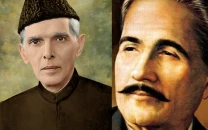Plural Pakistan: ‘National identity crisis at heart of communal divide’
Media was advised to “promote commonalities”.

Participants were also told that while there were many positive examples of inter-faith harmony the world over, many a times, the media stressed upon the differences between them. PHOTO: FILE
Religious scholars and political analysts have called for inclusive policy making and pluralism for achieving peace and harmony in the society.
“It is unfortunate that we are confined to our narrow identities, busy clashing with each other, dividing people and as a result denying many any role in nation building,” they said at a workshop on social harmony, conducted by Pakistan Institute for Peace Studies (Pips), here on Thursday.

If we want to progress collectively, we need to shape an inclusive national identity, which embraces people of all faiths and schools of thought, they stressed.
The workshop was attended by 50 young religious scholars from all schools of thought of Islam and members of religious minorities such as Hindus, Sikhs, and Christians from the Khyber-Pakhtunkhwa (K-P) province and the Federally Administered Tribal Areas (Fata).
Prof Qibla Ayaz said that the current realities called for coming up with frameworks, which peacefully accommodated people of different faiths. One of those realities, he pointed out, stem from the simple fact that many Muslims and non-Muslims now reside in each other’s countries in what he called as the “post-globalised world”.
Prof Ayaz argued that the differences between groups were due to “society, not religion.” At times, it was reminded, how political acts were couched in religious language, even though people of that religion might hardly offer support to those acts.
Participants were also told that while there were many positive examples of inter-faith harmony the world over, many a times, the media stressed upon the differences between them.
Prof Ayaz advised the media to “promote commonalities”.
In addition, the state of Pakistan too, participants were told, warned against religious discrimination. Quaid-i-Azam, for instance, clarified that people of all faiths were free to go to their places of worship in the newly-created state of Pakistan. Romana Bashir, a peace activist pointed out that the Constitution of Pakistan stressed upon equality among all citizens.
She lamented that the 18th Amendment passed in 2010 mandated that only a Muslim could be the prime minister of the country.
Bashir questioned the rationale, arguing that non-Muslims, who constitute three per cent of the population, already found it very difficult to rise to top positions.
Such divides, she argued, created a “psyche that treats the majority as superior and minority, inferior.”

Another speaker, Khurshid Nadeem, columnist and anchorperson, argued that in order to overcome sectarian divides, there was a need to address the challenges of narrow interpretation of religion, Islamised laws and social attitudes.
He further said that narrow interpretations created divides among faiths and Islamised laws led to exclusion of minorities from state building. Nadeem said that adverse social attitudes had the potential of marginalising minorities.
Ammar Khan Nasir, a religious scholar, also argued in favour of overcoming ideological, political and societal challenges, to promote inter-faith harmony in the country.
Saqib Akbar, from Akhuwat Academy said that a culture of dialogue should be promoted to resolve critical inter-faith conflicts.
Maulana Ahmed Yusuf Banuri, from Darul Uloom Islamia, Banuri Town appreciated the presence of different community members in the workshop, terming it an example of social harmony, which could be carried forward.
Published in The Express Tribune, May 1st, 2015.



















COMMENTS
Comments are moderated and generally will be posted if they are on-topic and not abusive.
For more information, please see our Comments FAQ